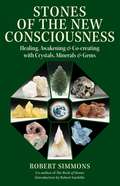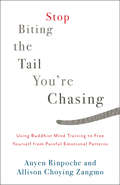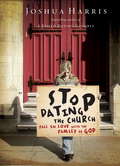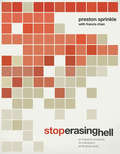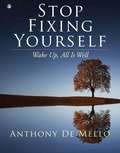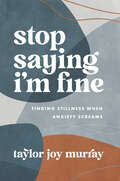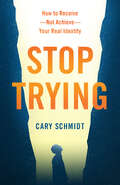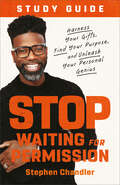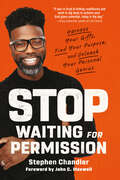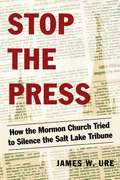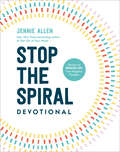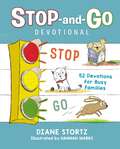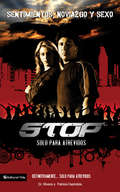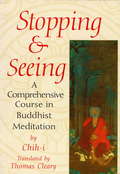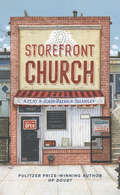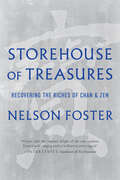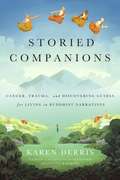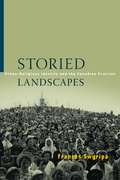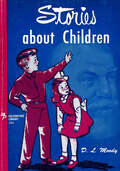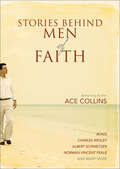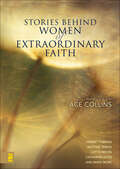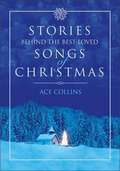- Table View
- List View
Stones of the New Consciousness: Healing, Awakening, and Co-creating with Crystals, Minerals, and Gems
by Robert Simmons• Details the spiritual, healing, and energetic qualities of stones such as Moldavite, Nuummite, Circle Stones, Nirvana Quartz from the Himalayas, and high-vibrational Natrolite from the emerald mines of Russia • Features color photos of exceptional examples of each of the stones • Includes practices for deepening one&’s awareness of the stones&’ gifts--from expanding consciousness, to healing, to awakening the Light Body, to fulfilling one&’s personal and collective destiny In Stones of the New Consciousness Robert Simmons examines the 62 most important stones to help accelerate and enhance conscious evolution and spiritual awakening. Each entry is illustrated with color photos of exceptional examples. The stones include Moldavite, the extraterrestrial amorphous crystal; Nuummite, the oldest gemstone on Earth; and Circle Stones, the highly energetic Flint found in crop circle formations. Other featured rarities include Nirvana Quartz from the Himalayas and high-vibrational Natrolite from the emerald mines of Russia. Simmons begins with a new approach to meditation with stones and to the possibility of conscious relationship with the spiritual beings who express themselves in our world as crystals and minerals. He includes historical and mythological references for each stone, positing that the fabled Stone of the Holy Grail and the Philosopher&’s Stone of the alchemists may have physical counterparts among the minerals discussed. Simmons presents practices for deepening one&’s awareness of the stones&’ gifts--from expanding one&’s consciousness, to healing, to awakening the Light Body, to fulfilling one&’s personal and collective destiny. While emphasizing direct contact with stones, the book also explores crystal energy tools, energy environments, and applications such as stone elixirs and essences that can aid anyone on a spiritual path.
Stop Biting the Tail You're Chasing: Using Buddhist Mind Training to Free Yourself from Painful Emotional Patterns
by Anyen Rinpoche Allison Choying ZangmoHow to be free from bondage to your emotions: a practical and powerful Buddhist teaching for training the mind to be content in any circumstance.Are emotions our friends or our enemies? Is it possible to free ourselves from emotional conflict? The Buddhist practice of lojong is a way of letting go of attachment to both “positive” and “negative” emotions and leads to profound insight and compassion, unbounded by our habitual reactions. This book provides a set of tools that you can apply in daily life to gradually relieve your own suffering and extend that relief to everyone you encounter.
Stop Dating the Church!
by Joshua HarrisPutting in their hour or two on the weekend, many Christians take the rest of the week off, neglecting the church and her needs. It's not a serious relationship. Some shop around, looking for a church that suits their lifestyle. It's dating, with no assurances, no obligations. Bestselling author Joshua Harris calls Christians to stop playing the field and commit, just as Christ is committed to us, His bride. In his new book, Harris explores the ramifications of Ephesians 5:25-32, which proclaims the intensity and the breadth of Jesus Christ's love for His church. God has designed us to build our lives around a local church; we cannot be indifferent or uninvolved. Rather, we must be in love with and committed to God's plan and purpose through the church. Areyoudating the church, or are you committed? Are You Dating the Church? We are a generation of consumers, independent and critical. We attend church, but we don't want to settle down and truly invest ourselves. We're not into commitment - we only want todatethe church. Is this what God wants for us? Stop Dating the Churchreminds us that faith was never meant to be a solo pursuit. The church is the place God grows us, encourages us, and uses us best. Loving Jesus Christ involves a passionate commitment to His church - around the world and down the street. We can't be apathetic. It's time to fall in love with the family of God. Story Behind the Book Like all my books, this one is very closely tied to my own journey. I've been a church-dater. And I've learned just how good it is to get serious about the church. I want to see my generation get a hold of God's purpose and plan for the local church, too. The same month this book is released I'll become the senior pastor of my church. This awesome responsibility is being passed on to me by my mentor, C. J. Mahaney, a pastor who has faithfully served for over 26 years. So this book is marking a very important transition in my life. The church isn't some other generation's responsibility-it isn't somebody else's business. I have to take responsibility. I have to be passionate and committed to it. Through the pages of this book, I'm calling my generation to do the same. From the Hardcover edition.
Stop Erasing Hell
by Francis Chan Preston SprinkleWhat do you believe about hell? How do you feel about a God who could send people there? Explore these tough questions in Stop Erasing Hell, as you walk through Scripture with Francis Chan and Preston Sprinkle to discern how what you believe about hell changes the way you live. In this interactive workbook based on the New York Times-bestselling book Erasing Hell, the authors wrap the study in prayer and impart courage for the journey ahead. This resource will help you learn more about the character of God, discover the biblical truth about the afterlife, and ask yourself the hard questions so that the answers can revolutionize your life. As you grapple with the topic of hell, let God transform your heart through renewed reverence for Him and love for the people around you. Stop Erasing Hell is a stand alone ten-week study that can be used by individuals or small groups, and includes weekend retreat options and guidance for small-group leaders.
Stop Fixing Yourself: Wake Up, All Is Well
by Anthony De MelloCan you imagine how liberating it would be to never be disillusioned again, never be disappointed again, never feel let down again? Want to wake up, come alive, and be free? Anthony De Mello&’s Stop Fixing Yourself is the answer you have been looking for.The question Anthony De Mello&’s Stop Fixing Yourself poses and successfully answers is: Can you attain enlightenment without the slightest effort on your part? Spiritual seekers exhausted from years of fruitless striving might well sigh deeply and think, &“If only that were true.&” Well, Anthony De Mello asserts it is true. Stop Fixing Yourself: Wake Up, All Is Well provides the simple path to living an enlightened life. De Mello tells us that if you are watchful and awake, all that is false and neurotic within you will drop away and you will begin to live increasingly from moment to moment in a life made whole and happy and transparent through awareness. Awareness transforms you from a seeker to a finder, opening your eyes to the reality of the love, peace, and beauty that has always surrounded you. Awareness will set you free. In Stop Fixing Yourself, De Mello&’s down-to-earth teaching method helps you discover true awareness, releasing the divinity all around you and making your life meaningful, beautiful, and prosperous.
Stop Saying I'm Fine: Finding Stillness When Anxiety Screams
by Taylor Joy MurrayThere is a deep well of pain, loneliness, self-loathing, trauma, and shame sitting behind the happy smiles and filtered social media feeds that so often characterize our generation.Many of us have become experts at pretending we’re fine. Our shiny social media feeds and screen-deep smiles certainly give off a happy illusion. But we are not fine. Taylor has heard countless stories from her generation of our fetal positions on cold-tile floors, immobilized by anxiety. She personally knows this place well. At eighteen, she, too, found herself in an anxiety-induced fetal position behind a locked bathroom stall, wondering, “What did Jesus mean when he promised me full life?”Stop Saying I’m Fine is a generational call to honesty, healing, and to a spiritual hunger that defies superficial Christianity and engages our deeper aches and heart questions. In these pages, we’ll dig beneath the bedrock of our anxiety into the pain of our experiences. Together, we’ll learn how to connect to the stillness that exists beneath the chaos, and we’ll find that the wholeness and healing we long for isn’t as distant as it may seem.For the young adult who feels trapped inside their anxietyFor the parent or caregiver who aches to understandFor the wounded heart that can’t seem to move onFor the weary one who has tried and failed a thousand other ways
Stop Trying: How to Receive--Not Achieve--Your Real Identity
by Cary SchmidtFrom looking outwardly to please others to looking inwardly to define ourselves, we constantly try to cultivate or construct our identities. But guided by the whims of culture or the faulty advice of tradition, we often find identity collapses when life falls apart or change threatens that fragile structure. Is it possible to discover an identity bolstered with unassailable confidence, strengthened for the challenges of life rather than destroyed by them, and free from the whims of cultural pressure? Yes! It is an identity received, not achieved—an identity established in the gospel. In Stop Trying, Cary Schmidt&’s storytelling creates compelling scenes in which you&’ll see yourself and your self. You&’ll understand why defining your identity outside of Jesus Christ is ultimately fragile, hollow, and unsatisfying. And you'll discover that your truest and most fulfilling identity is a byproduct of a relationship that changes everything.
Stop Trying: How to Receive--Not Achieve--Your Real Identity
by Cary SchmidtFrom looking outwardly to please others to looking inwardly to define ourselves, we constantly try to cultivate or construct our identities. But guided by the whims of culture or the faulty advice of tradition, we often find identity collapses when life falls apart or change threatens that fragile structure. Is it possible to discover an identity bolstered with unassailable confidence, strengthened for the challenges of life rather than destroyed by them, and free from the whims of cultural pressure? Yes! It is an identity received, not achieved—an identity established in the gospel. In Stop Trying, Cary Schmidt&’s storytelling creates compelling scenes in which you&’ll see yourself and your self. You&’ll understand why defining your identity outside of Jesus Christ is ultimately fragile, hollow, and unsatisfying. And you'll discover that your truest and most fulfilling identity is a byproduct of a relationship that changes everything.
Stop Trying: How to Receive--Not Achieve--Your Real Identity
by Cary SchmidtFrom looking outwardly to please others to looking inwardly to define ourselves, we constantly try to cultivate or construct our identities. But guided by the whims of culture or the faulty advice of tradition, we often find identity collapses when life falls apart or change threatens that fragile structure. Is it possible to discover an identity bolstered with unassailable confidence, strengthened for the challenges of life rather than destroyed by them, and free from the whims of cultural pressure? Yes! It is an identity received, not achieved—an identity established in the gospel. In Stop Trying, Cary Schmidt&’s storytelling creates compelling scenes in which you&’ll see yourself and your self. You&’ll understand why defining your identity outside of Jesus Christ is ultimately fragile, hollow, and unsatisfying. And you'll discover that your truest and most fulfilling identity is a byproduct of a relationship that changes everything.
Stop Waiting for Permission Study Guide: Harness Your Gifts, Find Your Purpose, and Unleash Your Personal Genius
by Stephen ChandlerMake the breakthroughs you need to sustain your God-given greatness with the perfect companion to Stephen Chandler&’s guide to unlocking your unique genius, Stop Waiting for Permission.Pastor Stephen Chandler believes with all his heart that God designed you for a purpose and filled you with potential. The Stop Waiting for Permission Study Guide is your road map to the journey of a lifetime, one that requires your active participation.Each of the ten sessions aligns with chapters from his book, Stop Waiting for Permission. Ideal for group or individual settings, this guide offers ample space to reflect on key questions and insights through four key sections:• Soak It In with a key biblical passage• Reflect on It through thought-provoking questions• Live into It with activities and prompts that make it real• Pray It Out by wrapping it up with focused prayerFrom the pastor of one of America&’s fastest-growing churches comes this bold, inspiring manifesto about how to dream, plan, and ultimately achieve your great calling in life. The time to act is now! Stop waiting for permission.
Stop Waiting for Permission: Harness Your Gifts, Find Your Purpose, and Unleash Your Personal Genius
by Stephen ChandlerFrom the pastor of one of America&’s fastest-growing churches, this bold, inspiring manifesto will show you how to dream, plan, and ultimately achieve your great calling in life.&“If you&’re tired of hitting roadblocks and want to dig deep to achieve your God-given potential, today is the day.&”—New York Times bestselling author Craig Groeschel, pastor of Life.Church We each have a unique purpose in this life, one embedded within us by the Creator of the universe before time began. Yet we rarely experience this greatness because the glory of God within us is still waiting to be uncovered. So we spend our lives running after the wrong goals. Eventually we burn out and stop believing that God has any bigger plans for us in light of our past failures and false starts. However, Stephen Chandler believes God created everyone, including you, for greatness . . . and doesn&’t want anything to get in the way of that destiny. In Stop Waiting for Permission, you&’ll discover the keys to unlock your unique calling and activate your innate, God-given strengths by • identifying what&’s holding you back • discovering your unique genius • maximizing your God-given greatness • living in your purpose with perseverance The time to act is now! Stop waiting for permission.
Stop the Press: How the Mormon Church Tried to Silence the Salt Lake Tribune
by James W. UreThis disturbing exposé examines how the powerful Mormon Church tried to destroy the Salt Lake Tribune, a voice that had long been critical of many of its activities and its secrets. The author, a Mormon and a journalist who once worked for the Tribune, tells a story of secret deals, behind-the-scenes backstabbing, and manipulation of the political and legal systems by a church that controls the politics of Utah. Based on many interviews and extensive research, the book describes the history of enmity between the Church and the newspaper, which came to a head in 2000. In that year, the Tribune reopened an investigation into an 1857 murder of a wagon train of 120 men, women, and children passing through Utah. The Mountain Meadow Massacre had been conducted by highly-placed church members and historians have said it was condoned by Brigham Young, the leader of the Mormon Church. The published stories intensified efforts by the Church to kill the newspaper. When a hedge fund took ownership of the Tribune, the Church in 2013 saw an opportunity to take advantage and ensure the paper's demise. Just as the paper appeared to be going under, a small group of citizens became the David that took down the Mormon Goliath and delivered the Pulitzer Prize-winning paper to a steady local owner who is willing to fight for its long-term survival. This is a cautionary tale about the dangers of mingling church and state and the ways in which big money can threaten the freedom of the press.
Stop the Spiral Devotional: 100 Days of Breaking Free from Negative Thoughts
by Jennie AllenStop spiraling thoughts and use your God-given power to think differently with this 100-day motivational resource inspired by the New York Times bestseller Get Out of Your Head, from the visionary behind the million-strong IF:Gathering.&“Jennie Allen speaks so powerfully to this generation and teaches us so simply how to not allow our limitations to be our loudest story.&”—Shelley Giglio, cofounder of Passion Conferences and Passion City Church, on Get Out of Your HeadAre your thoughts holding you captive? Are you worn out from getting stuck in patterns of anxiety, distraction, or cynicism? If so, do you know that God built a way for us to escape that downward spiral?Stop the Spiral Devotional, inspired by the New York Times bestseller Get Out of Your Head, is your invitation to begin noticing negative spirals—every day. In this book, you&’ll find one hundred days of devotions to inspire you to stop toxic thinking patterns and remind you of God&’s power to set you free. Each day&’s reading includes:• verses for meditating on God&’s Word• a &“Rewire the Spiral&” statement to repeat throughout your day• a personal prayer for sparking deeper intimacy with GodLet this hundred-day devotional guide you in refusing to be a victim to your thoughts and in realizing that you have already been equipped with God&’s power to live free.
Stop-and-Go Devotional: 52 Devotions for Busy Families
by Diane M. StortzHave intentional quality time with your little ones that&’s fun, educational, and meaningful for your family's faith journey with these short devotions.Written by bestselling author Diane Stortz, this to-the-point, interactive devotional gives bite-size teachings on how to follow God.?Stop-and-Go Devotional?provides short, active devotions based on Bible stories, designed for busy families with preschoolers and primary-grade children.Each devotion consists ofStop and Read—an action-filled Bible story;Think and Talk—an age-appropriate devotional thought with questions and a brief prayer; andGreen Means Go!—an easy and fun follow-up activity, a thought to remember, and a supporting Bible verse.Stop-and-Go Devotional?provides 52 devotions with verses and scriptures from the Old and New Testament;is an excellent gift for a birthday, baptism, or first communion; andis perfect for finding a peaceful quiet time before napping or bedtime.
Stop: Solo para atrevidos
by Patricia Espindola Silvano EspindolaEn realidad, puedes tener todo el conocimiento, todos los dones, toda la apariencia, toda la plata y toda la fuerza. Pero si no sabes qué hacer cuando tu corazón empieza a latir un poco más rápido por alguien, estás liquidado. Aprender a controlar tus sentimientos, cuidar tu corazón y manejar tu descontrolada sexualidad, sin dudas te convertirá en un genio atrevido. Y esa es la idea.
Stopping and Seeing: A Comprehensive Course in Buddhist Meditation
by Thomas Cleary"Stopping" and "seeing" are sometimes referred to as the yin and yang of Buddhist meditation--complementary twin halves of a unified whole. In essence, "stopping and seeing" refers to stopping delusion and seeing truth, processes back to basic Buddhist practice. One of the most comprehensive manuals written on these two essential points of Buddhist meditation is "The Great Stopping and Seeing," a monumental work written by sixth-century Buddhist master Chih-i. Stopping and Seeing, the first translation of this essential text, covers the principles and methods of a wide variety of Buddhist meditation techniques and provides an in-depth presentation of the dynamics of these practices.
Storefront Church
by John Patrick Shanley"Some of Shanley's sharpest comic writing in years... His intense engagement with questions of religion and ethics remains distinctive and invigorating." - Charles Isherwood, New York Times"There's a deeper philosophical vein that the author mines, allowing his language to acquire the heft and timbre of a serious moral debate...We taste bitterness, but also much that is sweet." - David Cote, TimeOut New York"A postmodern morality play that's as funny as it is bracing." - Karen D'Souza, San Jose Mercury NewsConcluding the "Church and State" trilogy of plays that began with Doubt and Defiance, Storefront Church tells the story of a Bronx Borough President who is forced by the mortgage crisis into a confrontation with a local minister. Blending earthy humor and philosophical reflection, this compassionate morality tale is an exploration of the often thorny relationship between spiritual experience and social action.John Patrick Shanley is the author of Doubt: A Parable (Pulitzer Prize for Drama, Tony Award for Best Play), Outside Mullingar (Tony nomination for Best Play), Defiance, Danny and the Deep Blue Sea and Dirty Story, among many other plays. He wrote the teleplay for Live from Baghdad (Emmy nomination for Outstanding Writing of a Miniseries, Movie or Dramatic Special) and the screenplays for Congo, Alive, Five Corners, Joe Versus the Volcano, Doubt (Academy Award nomination for Best Adapted Screenplay) and Moonstruck (Academy Award for Best Original Screenplay).
Storehouse of Treasures: Recovering the Riches of Chan and Zen
by Nelson FosterStorehouse of Treasures unearths wise and beautiful elements of Chan and Zen still little known in the West, revealing unexpected aspects of the tradition and new implications for practice.Since the dawn of Chan and Zen in medieval China and Japan, members of these schools have enlivened their teaching by creatively adopting and adapting terms, images, principles, poetry, and lore native to their societies. Unfortunately, so much of that cultural wealth has been &“lost in translation&” that Western practitioners have barely begun to discover and appreciate this extraordinarily rich legacy. In Storehouse of Treasures, second-generation American Zen teacher Nelson Foster makes a series of adventuresome forays into the trove of material laid up by the Dharma ancestors, bringing to light:Masters&’ delight in playing with words, stories, and inherited Buddhist concepts, bending them to express the Dharma in inspired ways The powerful influence that Taoist and Confucian thought exerted in the formation of Chan and Zen The emphasis the two schools have laid on excellence of character as well as on profound awakening The experiential meaning and enduring importance to the tradition of ideals little associated with it today, like integrity, shame, and contentment How &“knowing the tune&” of a fellow student, a mentor, or a teacher of old lies at the heart of transmitting the Dharma Lifting to attention a diverse set of ancient yet still luminous Dharma gems, Foster urges their relevance and value to us as students of the Buddha Way and as citizens of a world increasingly fractious and imperiled.
Storied Companions
by Karen DerrisA professor, mother, and Buddhist practitioner helps readers discover new ways of facing and experiencing life, death, and impermanence.&“With my diagnosis of grade IV brain cancer, I no longer observe the truth of impermanence from a critical, analytical distance. I am crashing into it, or it into me.&” Facing a terminal cancer diagnosis, Karen Derris—professor, mother, and Buddhist practitioner—turned to books. By reading ancient Buddhist stories with new questions and a new purpose—finding a way to live with her dying body—she discovers new ways to make them immediate and real. For instance, reading with her terminal prognosis, she becomes one of the four omens (the four signs of impermanence and suffering) the young Siddhartha sees in his excursions from the palace. What would it mean for her to be in the crowd, straining to see the prince with her own sick and impermanent body—to be pushed aside and out of sight by the palace minders, just as our society so often tries to brush aside anything uncomfortable, but to nonetheless be seen by the young bodhisattva? Or reading as a mother, maybe she shares something akin to what Queen Maya may have felt, knowing she was dying, giving her newborn son over to her sister&’s care? What will it mean for her own children to be motherless? She follows the knotted threads connecting Milarepa&’s angry, vengeful mother to Karen&’s own mother, who physically abused her throughout a traumatic childhood. By placing herself into these stories, she turns them from distant and static narratives into companions, and from companions into guides. Storied Companions interweaves Karen&’s memoir of her life of trauma and illness with stories from Buddhist literary traditions, sharing with the reader how she found ways to live with the reality that she won&’t live as long as she wants and needs to. Honest, powerful, and insightful, Storied Companions itself becomes an invaluable companion, guiding the reader to discover new ways of facing and experiencing life, death, and impermanence.
Storied Landscapes: Ethno-Religious Identity and the Canadian Prairies (Studies in Immigration and Culture #5)
by Frances SwyripaStoried Landscapes is a beautifully written, sweeping examination of the evolving identity of major ethno-religious immigrant groups in the Canadian West. Viewed through the lens of attachment to the soil and specific place, and through the eyes of both the immigrant generation and its descendants, the book compares the settlement experiences of Ukrainians, Mennonites, Icelanders, Doukhobors, Germans, Poles, Romanians, Jews, Finns, Swedes, Norwegians, and Danes. It reveals how each group’s sense of identity was shaped by a complex interplay of physical and emotional ties to land and place, and how that sense of belonging influenced, and was influenced by, relationships not only within the prairies and the Canadian nation state but also with the homeland and its extended diaspora. Through a close study of myths, symbols, commemorative traditions, and landmarks, Storied Landscapes boldly asserts the inseparability of ethnicity and religion both to defining the prairie region and to understanding the Canadian nation-building project.
Stories About Children (Colportage Library #226)
by Dwight L. MoodyStories About Children contains remarkable anecdotes connected with child life, which will touch the heart of the child and parent alike. These stories are perfect for illustrating gospel truths to children.
Stories About Children (Colportage Library #226)
by Dwight L. MoodyStories About Children contains remarkable anecdotes connected with child life, which will touch the heart of the child and parent alike. These stories are perfect for illustrating gospel truths to children.
Stories Behind Men of Faith
by Ace CollinsMaster storyteller Ace Collins offers deeply personal narratives of sixteen men whose living faith has made a vital difference in the world. Stories Behind Heroes of Faith uncovers the influences, the turning points, and the surprising twists that have created icons of faith, past and present, who continue to inspire us to live better Christian lives and to witness to others. Contemporary men such as Bono, Branch Rickey, Jim Valvano, and Fred Rogers and historical figures such as William Carey, John Newton, Albert Schweitzer, George Washington Carver, and Nicholas of Myra have inspired millions. They have led countless souls to follow in their steps and created legacies that have helped bring so much light into a dark world simply by courageously living their faith. Stories Behind Heroes of Faith will remind readers that with faith in God, anything is possible.
Stories Behind Women of Extraordinary Faith
by Ace CollinsTwenty women whose faith has reshaped the world.Ace Collins employs all his storytelling skill to uncover the deeply personal stories of women whose faith shines for us today. Explore twenty different tales of unparalleled inspiration. Learn how each woman’s prayers were heard and answered, and discover how each story can light the way on your own journey of faith.
Stories Behind the Best-Loved Songs of Christmas
by Ace CollinsBehind the Christmas songs we love to sing lie fascinating stories that will enrich your holiday celebration. Taking you inside the nativity of over thirty favorite songs and carols, Ace Collins introduces you to people you've never met, stories you've never heard, and meanings you'd never have imagined. The next time you and your family sing "God Rest Ye Merry Gentlemen," you'll have a new understanding of its message and popular roots. You'll discover how "Angels from the Realms of Glory," with its sublime lyrics and profound theology, helped usher in a quiet revolution in worship. You'll learn the strange history of the haunting and powerful -O Holy Night," including the song's surprising place in the history of modern communications. And you'll step inside the life of Mark Lowry and find out how he came to pen the words to the contemporary classic "Mary, Did You Know?" Still other songs such as "O Come, O Come, Emmanuel" trace back to Mysterious origins--to ninth-century monks, nameless clergy, and unknown commoners of ages past. Joining hands with such modern favorites as "White Christmas" and "The Christmas Song," they are part of the legacy of inspiration, faith, tears, love, and spiritual joy that is Christmas. From the rollicking appeal of "Jingle Bells" to the tranquil beauty of "Silent Night," the great songs of Christmas contain messages of peace, hope, and truth. Each in its own way expresses a facet of God's heart and celebrates the birth of his greatest gift to the world--Jesus, the most wonderful Christmas Song of all. The complete lyrics of the spiritual songs are included.
